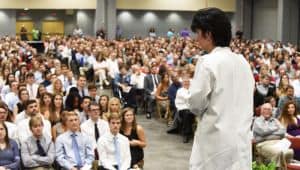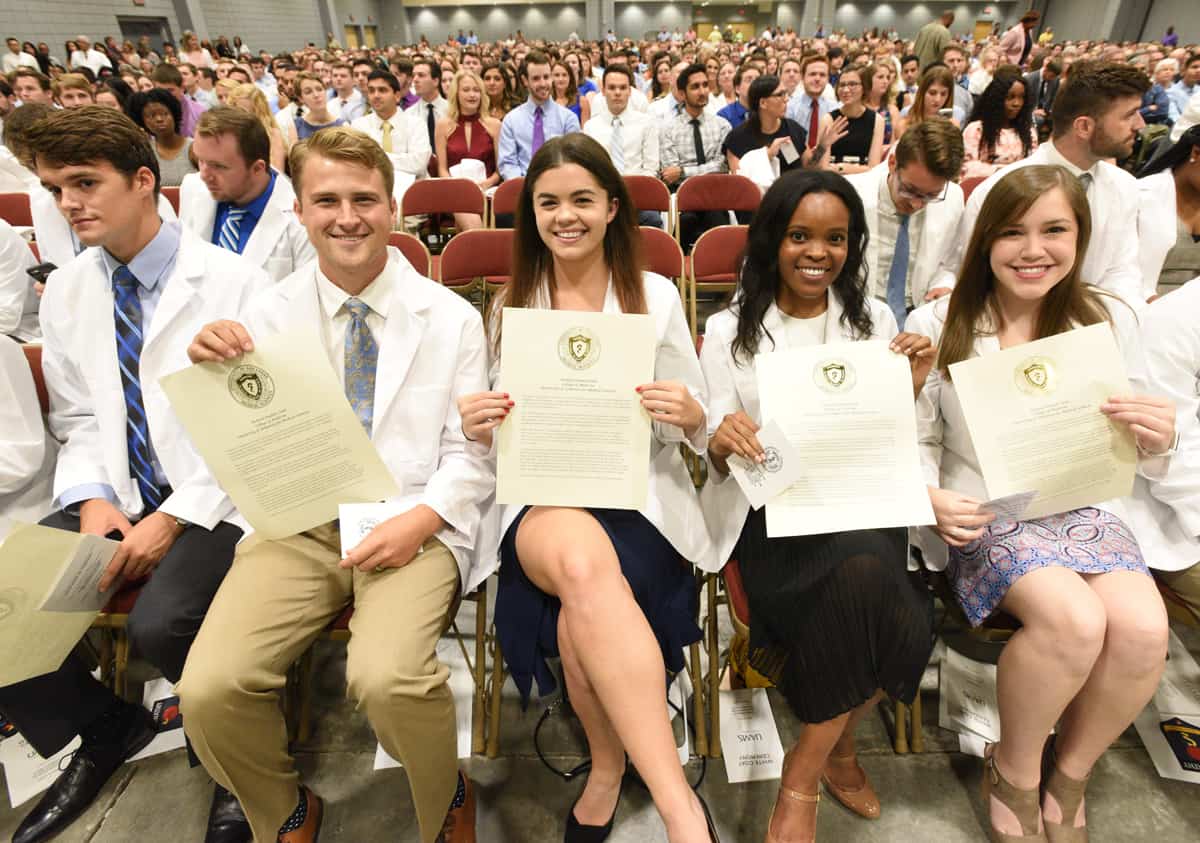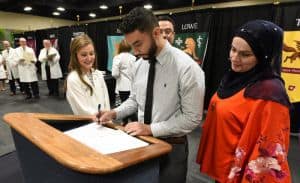White Coats Mark Beginning of Medical School Journey for COM Class of 2022
| Aug. 17, 2018 | As Linda L.M. Worley, M.D., began her keynote address at the White Coat Ceremony for the UAMS College of Medicine Class of 2022, she said she felt like she was officiating a wedding.
It was a fitting comparison, as the annual ceremony is steeped in tradition and emotion. Before a crowd of their family and peers, each of the 174 members of the freshman class put on their white coat and promised to uphold everything it stands for. With that, they marked the beginning of their journey toward becoming physicians.
“This ceremony, it’s a rite of passage for you, into the whole profession of medicine. This white garment – it’s more than just a piece of white fabric, it’s so symbolic of what we do in our profession,” said Worley, associate dean for the UAMS Northwest Regional Campus.

Each student was assisted in putting on their white coat on stage by family or mentors they selected.
Like a wedding, each player in the ceremony had a role, and many brought gifts.
Christopher T. Westfall, M.D., interim dean of the College of Medicine, gave the gift of history. The practice of holding a white coat ceremony to mark the beginning of medical school began at Columbia University in 1993, but Westfall referenced deeper roots.
“As Hippocrates said, ‘Wherever the art of medicine is loved, there is also a love of humanity,’” Westfall said, noting that the 174 freshmen had been selected from among 2,400 applicants. “You are here because we believe you share Hippocrates’ love of humanity.”
Westfall said the ceremony is meant to emphasize the importance of ethics, professionalism and compassionate care. He asked the students to think about what the white coat means to them – achievement, hope for the future and a desire to help others – and what it will mean to their patients – trust in their abilities and hope for healing.

Linda L.M. Worley, M.D., associate dean for the UAMS Northwest Regional Campus, addresses the standing-room-only crowd.
Westfall said it is important for medical students to begin thinking about tradition, history, ethics and standards from the start of their medical school journey, not just at the end, when they will recite the Hippocratic Oath, which dates back to ancient Greece.
“Your white coat symbolizes commitment, not just to learning the science of medicine, not just to acquiring those skills that allow you to diagnose and treat disease, but to serve your patients with honor, integrity and compassion,” Westfall said.
Richard P. Wheeler, M.D., executive associate dean for academic affairs, gave the gift of tradition. He led the students in the “Medical Student Oath,” which emphasizes compassion, confidentiality, integrity, cooperation, tradition, respect, humility and commitment. It concludes: “May I be worthy of this trust and may I always remember that henceforth, I must put others before myself.” As each student crossed the stage, they signed their name to an oath book before donning their white coats.

Christopher T. Westfall, M.D., interim dean of the College of Medicine, tells the crowd that the ceremony emphasizes the importance of medical ethics, professionalism and compassionate care.
The families and peers gathered for the ceremony gave the gift of their support, filling the 1,500-seat hall with the buzz of excitement and pride. Each student had the option to take people on stage with them. Those supporters helped the students put on their white coats, or the students were helped by mentors from each College of Medicine class “house,” a structure that facilitates mentorship and peer support.
The Class of 2022 clearly brought with them many individual stories of their own. One student was helped by her four children, who also put around her shoulders a stethoscope engraved with the initials of a fifth child who died at six weeks. A set of siblings in the class crossed the stage together into the journey ahead. There were many fathers, mothers, aunts and uncles who are doctors and were there to help the next generation of the family enter the profession. Jackson Weaver was helped by his 94-year-old grandfather, Bill Weaver, M.D., who graduated from the UAMS College of Medicine in 1952.
And finally, Worley gave the students the gift of perspective. She reminded them that despite the importance of the road ahead, nothing was more important than making sure they take care of themselves along the way. She encouraged them to get plenty of rest, thrive by connecting with others and give everyone kindness and compassion, starting first with themselves.
She led the room through an exercise asking each person to imagine themselves in one of the most vulnerable places of their lives in need of medical care and asked them to imagine the characteristics they most hoped the physician who would come through the door would have. Empathy, compassion, being skilled and knowledgeable, were mentioned, as was integrity, listening skills, relatability and honesty.
“I bet no one in this room said, ‘I want them to have a 4.0 GPA,’” Worley said. “People demand perfection, it’s true. And if you didn’t hold yourselves to high standards, you wouldn’t be here. Give this world your very best, staying centered in a loving presence while seeking the good in others and reflecting it back. Learn what matters to them. Offer hope and healing.”

